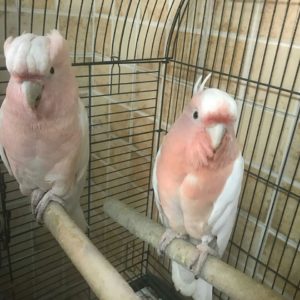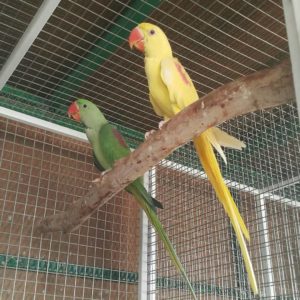Personality & Behavior
 Parrots can be loud or quiet, boisterous or reserved, problem-solvers or laid-back. Sound contradictory? That’s because parrots are individuals with individual personalities. Some generalities among species are recognized, but keep in mind that any bird can be the exception to a generalization.
Parrots can be loud or quiet, boisterous or reserved, problem-solvers or laid-back. Sound contradictory? That’s because parrots are individuals with individual personalities. Some generalities among species are recognized, but keep in mind that any bird can be the exception to a generalization.
Before jumping into species generalizations, differences also exist based on age. Young and immature birds that are cute and cuddly can become more demanding or even aggressive when they mature and breeding season arrives. And older birds might turn standoffish or needy, depending on the changes that occur as they age.
The Lafeber Pet Bird Selector classifies companion birds into four categories of interaction: Highly social, social, somewhat social, and hands off. The most species fall into the social category. Being social doesn’t necessarily mean a bird wants to cuddle, but your attention is a must. Highly social birds range from the intelligent and sensitive African greys to the almost needy cockatoos. The social species include cockatiels, budgies, several species of macaws, Amazons, lovebirds, parrotlets, and more. Let them know they’re part of your family/flock, and all is well. The bird species that are hands-off according to the bird selector are actually not parrots. They are finches, canaries, and doves. Set them up in a nice habitat and enjoy watching and listening to them. Finally, the category with the smallest number of birds is the one called somewhat social. Rosella parrots make up this category. Consistent interaction with them keeps them tame.
 One thing that’s common for almost all parrots is that they’re messy. Eating for birds is an event, and they enjoy interacting with their food. That means food gets dropped, flung, squirted, and ricocheted. This is natural for parrots, and part of the reason that the nutritious foraging of Lafeber foods is such a bonus. It delivers excellent nutrition while encouraging interaction, and every bit is so tasty that parrots seek it out. In addition to food mess, bird droppings create debris. Some species, like cockatoos and cockatiels, emit a fine dust from their feathers. Put all of this into a cage where a bird moves around and flaps, and it’s a recipe for a mess. But numerous inventions help minimize this and today’s cleanup tools make keeping your parrot’s cage clean quick and easy.
One thing that’s common for almost all parrots is that they’re messy. Eating for birds is an event, and they enjoy interacting with their food. That means food gets dropped, flung, squirted, and ricocheted. This is natural for parrots, and part of the reason that the nutritious foraging of Lafeber foods is such a bonus. It delivers excellent nutrition while encouraging interaction, and every bit is so tasty that parrots seek it out. In addition to food mess, bird droppings create debris. Some species, like cockatoos and cockatiels, emit a fine dust from their feathers. Put all of this into a cage where a bird moves around and flaps, and it’s a recipe for a mess. But numerous inventions help minimize this and today’s cleanup tools make keeping your parrot’s cage clean quick and easy.
Parrots are known to be intelligent, African grey parrots in particular, as documented by Dr. Irene Pepperberg. Never underestimate a parrot’s ability to understand you, escape from an enclosure, or reach something the parrot wants. Opportunities for play and interaction are important for all parrots, whether with you or with another of the parrot’s species. Toys are critical for parrots, especially puzzle toys, foot toys, destroy toys, mirrors, bells, and more.

